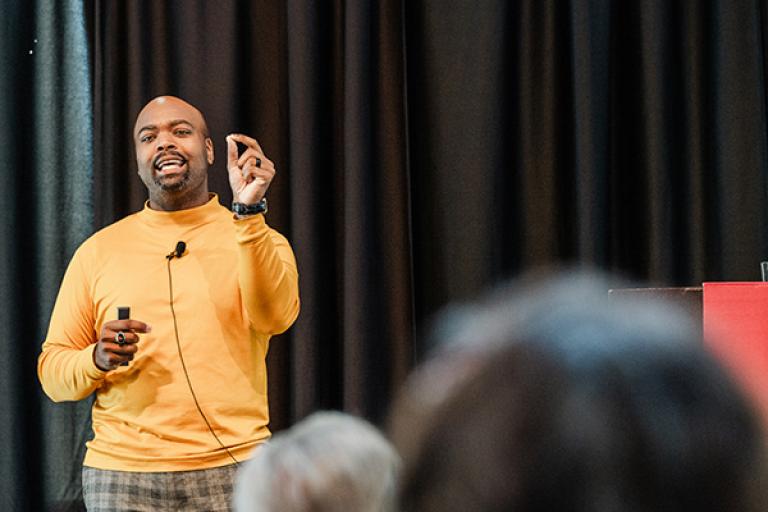2024 Spring / Summer
A conversation with Darrius Stanley

Darrius Stanley is an assistant professor in the Department of Organizational Leadership, Policy, and Development and the Carmen Starkson Campbell Endowed Fellow for Innovation in Teacher Development. He has been a familiar face at LEAD, presenting the breakout session “Introducing Community Engaged Leadership: How Schools Can Serve Communities” in 2022 and giving the keynote address “Community Engaged Leadership: A Call to Action for Educational Leaders” in 2023. He will be presenting a facilitated session on the importance of Black educators in 2024. We asked him to provide some thoughts about the conference.
Why is it important for you to be involved in the LEAD Conference?
The LEAD conference is critical for bridging the pervasive research-practice divide in the field of education. As such, I am involved because I am committed to ensuring that the research, which is so often housed in the “ivory tower,” makes it to the frontlines where educational practitioners can do the work of contextualizing and eventually operationalizing new knowledges and perspectives. Further, I see myself as a community-engaged scholar. Simply put, that means that my research, teaching, positionality, community situatedness, and connectedness are inextricably linked; research is for and with the communities I am connected to. LEAD is a space to broaden and deepen those connections.
What do you hope attendees get out of your presentations? In your mind, what are the key takeaways?
My work is focused on bridging historically disenfranchised communities and schools through Community-Engaged Leadership approaches and practices. Hence, I always want attendees (practitioners) to walk away recognizing the historical and contemporary fissures and fractures that have created the kind of distance we see between schools and communities which have been disenfranchised; we must see this as a form of state-sanctioned, systemic harm and recognize our roles in redressing these inequities. Further, I hope that attendees leave my presentations committed to seeing their work through the lens of community; that is, educational leadership committed to justice and liberation must center community knowledges, dreams, histories, expertise, and context over state-sponsored and school-centric goals. School-centric goals often have little to do with the liberation of Black, Brown, Indigenous, and other peoples who experience oppression in school-community contexts. I recognize that this is tough to do given the state-level mandates, messages, and accountability measures; if we are committed to justice and liberation, communities must be at the center of school decision-making.
What have been some of your takeaways from the conference?
What has been most inspiring is that school and district leaders are committed to learning the “how” and the “why” of equity-focused educational leadership. I walk away from the LEAD conference hopeful that change is both in progress and imminent in many Minnesota school and district contexts. I guess that hope and inspiration are my biggest takeaways.
What is your favorite part of the conference?
I always love to hear the questions from practitioners after the keynotes. So many of our state’s educational leaders are trying to increase their (and district personnel) capacities for equity- focused leadership. The questions often create the space or at least plant the seed for additional, more nuanced dialogue relevant to the specifics of the school district.
What do you think makes the LEAD Conference unique?
I think this conference is unique because it draws a diverse array of experts: nationally recognized scholars, local, equity-focused scholars, and state practitioners. In my experience, it is rare to have such a unique set of knowledges in the same space. So often, conferences are dominated by singular or even monolithic perspectives; this conference helps break the hegemony and groupthink present in different conference spaces. LEAD creates ripe opportunities to historicize, contextualize, and operationalize ideas from multiple perspectives. Moreover, I think there is enough room for disagreement, variance, or even dissent, which is always a plus when it comes to learning.
How do you see the conference evolving over the next few years?
As someone who has experienced it on multiple levels (participant, presenter, and keynote), I think that the opportunities are endless. The key for me is staying committed to the journey of equity; that is, I hope LEAD continues to expand and attract educational leaders from all over the state. The work of equity has to be central to the praxis of all educational practitioners. Maybe more in the way of networking and sharing of ideas is on the horizon.
View Darrius Stanley’s keynote address and other 2023 LEAD presentations.